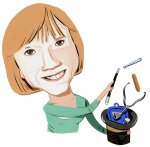As a nurse, technology affects my job.
I am surrounded by PCs, pumps, vein viewers, EKG machines, and other devices. You might think you knew everything there was to know about technology, until you hit the floor. You’ll learn even more. New nurses are surrounded by a variety of unfamiliar devices that you have to master via in-services or on the job-- often in a short period of time.
So how do you master the new technology that surrounds you?
1. Be comfortable with the skills you already have. They can readily be used in new applications. For instance, most new nurses are familiar with programs, such as Microsoft Windows and Office products (Word, Excel, PowerPoint, Access). Knowing UNIX or another operating system and the basics of web browsers is also helpful. All of this knowledge helps as you learn how to use most hospital applications.
2. Be willing to invest time in learning new skills. Take time to read the material you're given in your classes. You'd be surprised that many times people have a great manual, but never use it.
Also, ask for help if you need it and see how others do things. With most applications, there is more than one way to achieve the same process. When you have a free moment, look at all the menus in the application. Work your way around. Even take the time to check out the online help, if there is any.
And don’t forget to ask the tech support people about resources. That's their job to support you doing your job. And they can't help you if you don't ask.
3. Learn your workplace standards. Standards vary from workplace to workplace. Some facilities say, "All patient education should be from Micromedex"—or whatever education package they've bought. You can do your own one-to-one education about meds when you pass them, but in some facilities, if you have to print something, they want you to use the facility standard.
I mention this because there are many folks out there who believe some Internet resources are a standard--and they are not.
A case in point is Wikipedia. It is a standard reference, but it is not necessarily evidence-based. In fact, some of its information is wrong. If I want specific, research-oriented information on a topic, I would never use it. I'd use a CDC site, emedicine.com, or other federal site—an “evidence vetted site." This means that there's an adequate bibliography of the evidence presented. If a patient asked me about their health condition, I would use an information source or database that my facility recommended, especially if that's part of the facility's policy and procedure.
4. Keep resources close at hand. If your facility permits it, load your resources on your favorite device. I couldn't have made it through nursing school or my first year as a nurse without my Palm TX and my medication, lab, and medical dictionary references on it. You don't have to worry about the computers being down or your books being in your locker. I carry my PDA wherever I go, allowing me to check something right away, even while I talk to a patient. A PDA is also a lighter load than a bunch of books and can be updated frequently.
Knowledge is power, so don’t be afraid. Go out and learn!
|
||||||||||||
 |
||
search realityrn
sign up for weekly cartoons, tips, and blog posts
Register to win a pair of RX Medical Silver Fox Crocs
|
|
|









